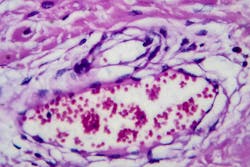A treatment that rallies the immune system to destroy cancer raised the survival rate for advanced Hodgkin lymphoma patients to a remarkable 92 percent, suggesting a new standard therapy for the disease.
The New England Journal of Medicine published the clinical trial results this week.
With this new treatment, scientists believe they found a way to reduce long-term side effects of therapy—including second cancers later in life and heart and lung conditions.
Key points from the trial, known as S1826:
- Nearly 1,000 patients enrolled in the randomized, phase 3 trial at hundreds of cancer clinics and academic institutions across the U.S. through the SWOG network. The median age of patients with Hodgkin lymphoma in the study is 30.
- Half of the patients received the latest standard therapy: chemotherapy and a drug called brentuximab vedotin. The other half also received chemotherapy plus an immunotherapy, nivolumab, which targets a genetic alteration common in Hodgkin lymphoma.
- After two years of follow-up, 92 percent of the immunotherapy group had survived and saw no progression of their disease, versus 83 percent in the standard care group.
- Researchers designed the study to be highly inclusive. One-third of participants were pediatric patients as young as age 12; about 10 percent were older than 60; and 25 percent were from underrepresented groups.
- Historically, pediatric patients with Hodgkin lymphoma often received radiation therapy along with chemotherapy. That treatment, although successful at killing cancer, would often result in significant side effects with life-long implications. In this trial, researchers chose not to not use radiation therapy to minimize those problems and saw fewer side effects and adverse events among the patients who received the immunotherapy.
- The trial took an exceptional approach to combine young and older patients into one study, giving them the exact same treatments. Harmonizing treatments across age ranges is now serving as a model for other planned studies for adolescents and young adults with cancer, Friedberg said, and it will allow physicians to rapidly introduce novel cancer treatments into the younger population.
The preliminary trial data was so strong that the NCI ordered the study to halt early to facilitate a faster review by the U.S. Food and Drug Administration. In 2023, the American Society of Clinical Oncology (ASCO) highlighted those results, which at that point had one year of follow-up data. The latest study confirmed the initial findings.
The FDA will determine whether nivolumab should be added as standard treatment for stage 3 or 4 Hodgkin lymphoma.

